Biographies
Sapper Jack Bassett
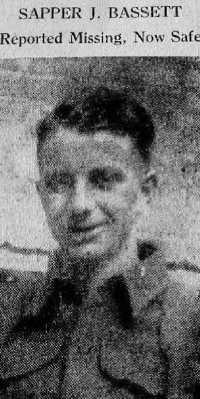
Tewkesbury Register 17 March 1943
REPORTED MISSING - NOW SAFE
[Mr. William and] Mrs. [Amy] Bassett of 15 North East Terrace, on Monday received a post card from her son, Sapper Jack Bassett, from a Japanese Prisoner of War Camp, upon which he has written this message:
“Love to all, do not worry: I am quite well - Jack”
The message gives relief to a long period of anxiety. In April 1942, Mrs Bassett was informed that her son was missing in Malaya. She also received a cablegram from him that he was safe and well, but this was delayed in transmission, and had been despatched before the fall of Singapore, where he became Prisoner of War: therefore nothing had been heard of him since he was reported missing, until Monday morning when the welcome postcard arrived.
Sapper Jack Bassett, 212044, Royal Engineers, Died aged 23 on 27 September 1943. Buried at Kanchanaburi War Cemetery, Thailand.
We cannot rely upon the Register because the good news it conveyed proved to be illusory. Sapper Bassett was one of those Japanese POWs who died at an indeterminate time and place. Much of the information about such prisoners emerged in September 1943. It is the Commonwealth War Graves Commission which has suggested the date of his death, it is clear that he was captured earlier, during the surrender at Singapore. Because he was serving with an unnamed unit of the Royal Engineers, which had multiple companies serving in the theatre, it will be difficult to be certain precisely how he was captured.
Gunner Ronald W.E. Bartlett
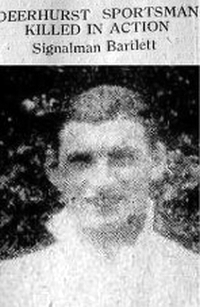
Tewkesbury Register 7 March 1942
DEERHURST SPORTSMAN KILLED IN ACTION
Signalman Ronald W.E Bartlett was 25 [sic] years of age, was educated at Deerhurst C of E School and was a regular attendant at Deerhurst Church, where his father is leader of bell-ringers. In civilian life, Mr Bartlett was an agent for the Prudential Assurance Company working at West Bromwich.
He was called to HM Forces in the early spring of 1940 and served as a Signaller in the Royal Artillery. He was killed in the Far East. During the last ten years, he had been an active member of the Apperley Court Cricket Club and was one of the best bats and medium fast bowlers in the district.
Gunner Ronald William Ernest Bartlett, 974427, 88 Field Regiment, Royal Artillery, died aged 27 on 1 January 1942. Remembered with honour in Taiping War Cemetery, Malaysia. Son of William Henry and Kate Bartlett, of Deerhurst, Gloucestershire.
According to the Tewkesbury Register, Ronald Bartlett’s death was a sad loss to local sport.In fact Ronald Bartlett died much earlier on 1 January 1942 during the Japanese onslaught on Malaya. His unit was attached to the 9th Indian Division, which carried out a relatively successful defensive retreat down the coast of Malaya, before the eventual fall of Singapore. According to the CWGC, “Taiping then was on the British line of retreat down the west coast. Its normal garrison of one Indian Infantry Battalion had been augmented, a casualty reception station organised, arrangements made with the civilian authorities for the provision of 500 beds for military patients.”
Lance Corporal Arthur W. Hawker
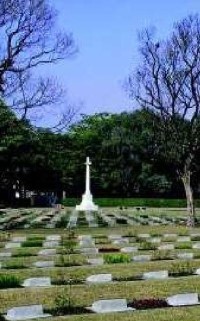
Tewkesbury Register 3 June 1944
DEATH OF APPERLEY SOLDIER.
Mr and Mrs C. Hawker of Lower Apperley, have received news that their son, Arthur, has died of wounds in Burma. L/Cpl Arthur William Hawker, was in his 25th year, and at the outbreak of war, was working for the Gloucestershire County Council. He joined up in 1939, in the Gloucestershire Regiment, and came through Dunkirk. Later he was transferred to another unit, with which he was serving at the time of his death. L/Cpl Hawker was educated at Deerhurst C. E. School.
Lance Corporal Arthur William Hawker, 5186723, 1st Battalion, Royal Welch Fusiliers who died age 24 on May 5th 1944. Son of Charles A. and Louisa Hawker, of Lower Apperley, Gloucestershire. Remembered with honour in the Imphal War Cemetery, India.
We can presume that, in view of his service at Dunkirk, Arthur Hawker was a member of the Territorial Army. It often happened in this war that men were posted to units without regard to family ties. L/Cpl Hawker was killed trying to stop the Japanese attack on India in battles which took place near Imphal and Kohima from April to June 1944. He fell during the turning point of the battles as his battalion tied to capture Kohima Ridge. There is a monument at Kohima to the Welch Fusiliers and it is claimed that the battles represented the “turning point” in the land war against Japan: the eventual failure of a siege marked the end of their planned invasion of India. The battle was fought to a standstill by Anglo-Indian troops, who decimated the sick, hungry, and overextended Japanese troops, deprived of sufficient logistical support because of the overconfidence of their high command. The distraction of this offensive allowed the Chindits –landed and supplied from the air – to operate in strength behind enemy lines, cutting supply lines and cooperating with US and Chinese troops during operations in northern Burma and attacks on Myitkina. This caused the Japanese army to begin its retreat.
Unfortunately the Register did not provide a photograph of Arthur Hawker.
Private Charles D. Hemming
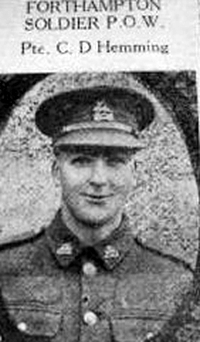
Mrs Hemming, of Sanctuary Cottage, Forthampton, on Saturday received a notification that her husband, Pte. Charles Donald Hemming, of the Royal Berkshire Regiment, who was reported missing on the 15th of February, is a prisoner of war interned in Malaya Camps, (far east). Pte Hemming is 30 years of age, and is a native of Pendock. Five and a half years ago, at Forthampton, he married Miss Strawford, and there are two children. Before joining the Army in 1932, he was a gardener in Pendock. He has seen much service, and was in the Dunkirk evacuation.
Private Charles Donald Hemming, 5334431, Royal Berkshire Regiment, died age 31, December 20th 1943. Husband of Nora Hemming, of Forthampton, Remembered with honour at Thanbyuzaat War Cemetery.
Private Hemming had disappeared soon after the Japanese forced the surrender of the “impregnable” fortress of Singapore on February 8th 1942, but nothing was heard until a report in the Register. From this report we can deduce that Charles Hemming was driven into the army by need for work in 1932 and had been an experienced, professional soldier who had survived Dunkirk. He would, no doubt, have been used as a slave labourer on the notorious Burma-Siam Railway which was a Japanese project driven by the need for improved communications to support the large Japanese army in Burma. During its construction, approximately 13,000 prisoners of war died and were buried along the railway. Two labour forces, one based in Siam and the other in Burma worked from opposite ends of the line towards the centre. The Japanese aimed at completing the railway in 14 months and work began in October 1942. The line, 424 kilometres long, was completed by December 1943. Charles Hemming died in ‘hospital ‘ at Thanbyuzayat, a prisoner of war HQ since 1942. Over three thousand servicemen are buried there. In 1996 Burmese Government at last permitted war widows to visit Thanbyuzayat: Pte. Hemming’s widow, Nora, was one.
Bombadier Frederick Leonard Key
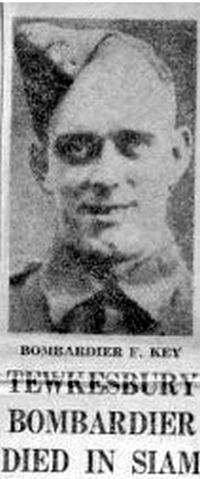
Bombadier Frederick Leonard Key, 1073700, 137 Field Regt., Royal Artillery who died age 33 on June 3rd 1943, remembered with honour in Thanbyuzayat War Cemetery, Myanmar.
Bombadier Key's daughter is Mrs. Barbara Wagstaff, born in 1939; she never knew her father. Frederick Leonard Key was the son of William Arthur Key alias 'Sailor Key' and grandmother Nellie Key; the family home was 46 Church Street. He was born in 1910 but claimed to be a year older in order to join the Royal Horse Artillery in 1927. He served from 1927 to 1930 but rejoined the colours in 1939. From 1930 to 1939, he had worked for Severn Catchment Board as a dredger operator, working on sluice at Abbey Mill. He married Gladys I. Wathen in 1938.
By September 1941, he was seconded to the Lancashire Fusiliers but was captured as soon as he landed at Singapore, when he was posted as missing. He was only officially notified as a POW on January 28th 1943 – a year after his capture.
He died of cholera June 3rd 1943 at Sankrai Camp. To die from cholera is a terrible experience – and 130 people died in Tewkesbury in two epidemics in 1832 and 1849. The end is very painful as the body dehydrates and expels all body fluids; the body turns black. Cholera is caused when drinking water is contaminated by sewage so we can start to understand what conditions POWs like Frederick Key were forced to undergo in addition to the long hours of labour, the brutality and the hardship of working in a humid jungle alien to Europeans. To have died of cholera like this was not manslaughter – but murder.
Moreover because Mr. Key ‘died’ in Thailand, he did not qualify for Burma Star. Not only forgotten but neglected!
In 1996 Barbara and her mother joined the first party to be admitted by Burmese authorities to see their war graves. Dr. Shephard also visited the grave of his brother.
Private Alexander George Martin
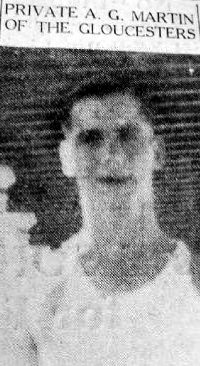
Mrs. E. E. Martin of Hayes Court, Barton Street, received the sad news that her son Pte. Alexander George Martin, of the Gloucestershire Regiment, died in Burma on the 29th of November, while in enemy hands. The deceased soldier was reported missing in December 1942. He was 35 [sic] years of age and an old pupil of the Abbey School; before joining the army at the age of 14 years, he was in the employ of Messrs. Hunters. He had been abroad for nine years and held the Army Certificate of Education, and in 1937 was the first in the Regimental light weight boxing tournament at the Madras Presidency Olympia, and held the certificate signed by the Governor. Mrs Martin has another son, Signaller James John, now serving with the Mediterranean forces.
Private Alexander George Martin, 5182332, Gloucestershire Regiment and Commando who died age 28 on November 29th 1943. Remembered with honour at the Rangoon War Cemetery, Myanmar
The Register of 8 January 1944 reported the bare facts of the death of Alexander George Martin. Rangoon War Cemetery, outside the capital city of Burma which is now known as Myanmar, was only created in 1948 after bodies buried in temporary cemeteries were collected in one safe place. One rarely knows specifically how a Japanese POW died but the CWGC does record that, amongst the burials, were POWs from Rangoon Jail. Pte Martin is actually buried in a collective grave along with three RAF men, an RAMC and one RAAF, all of whom died on the same date, November 29th 1943. The Australian airman was killed as a result of a British bombing raid, according to a post-war release statement from one of the Australian’s fellow prisoners of war, who had been captured with him in mid 1942. It is likely that all six men died in the same raid. Three American prisoners are also known to have died in the same raid.
Lieutenant Edward Henry Morris
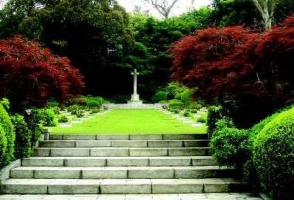
Tewkesbury Register 27 April 1946
DEATH OF TWYNING OFFICER IN JAPAN.
It is with regret we record that Brigadier and Mrs David Morris, of Churchend Twyning, have received the news that their only son Lieut. Edward Henry Morris, RE has been killed in an accident while on service with the BCOF. in Japan. This happened on the 9th of April. Lieut. Morris who was twenty-two years of age, and much sympathy will be extended to his parents in their loss.
Lieutenant Edward Henry Morris, 273464, 5 Field Coy., Royal Engineers who died age 22 on 9 April 1946, son of Brigadier David Morris, OBE, and Anna K. F. Morris, of Twyning, Gloucestershire. Remembered with honour at Yokohama War Cemetery, Japan.
The report of Lieutenant Morris’s death appeared in the Register of April 27th 1946. Sadly, accidents continued to claim the lives of service personnel on occupation duties during the years that followed the end of World War Two. Lieutenant Morris, who was born in Chatham on 27th September 1923, lies in the British Section of Yokohama Cemetery. A twenty-year-old Royal Army Service Corps driver from Bristol died on the same day and is buried in a nearby grave. Until further information comes to light, it can be surmised that Lt. Morris died in a road traffic accident.
Private Lionel Henry James Osborne
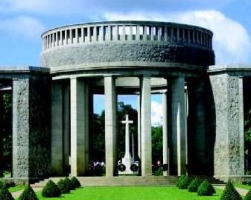
Tewkesbury Register 23 May 1942
TEWKESBURY SOLDIER MISSING:
Pte. L. Osborne. Mrs. Ethel Curtis, of Hollams Road Tewkesbury, has received an official notification that her son, Private James Osborne of the Gloucestershire Regiment, has been posted as missing in the Eastern theatre of war. Private Osborne, before joining the Regiment in 1937 was employed on the farm of Mr. W. Mitchell, of Northway Court. He was 22 [sic] years of age and was educated at the Abbey Boy’s School.
Private Lionel Henry James Osborne, 5183610, 1st Bn., Gloucestershire Regiment, who died age 23 on March 19th, 1942, son of Frederick William and Ethel May Curtis, of Tewkesbury. Remembered with honour at the Rangoon Memorial, Myanmar
The brief report of Pte, Osborne’s death was in the Register, May 23rd 1942. Unfortunately no photograph was published. Because the date of his being posted missing and that recorded by the CWGC as his date of death are close, we can only surmise that Pte. Osborne was either killed in action against the Japanese in the chaotic scenes that accompanied the British abandonment of Rangoon on March 7th 1942, or in the fighting that followed. Because of censorship, the Register could be no more precise about the location than “Eastern theatre of war”. However, as with Pte. Martin, some graves in Rangoon Cemetery belong to prisoners of war.
Private Cecil Ryland
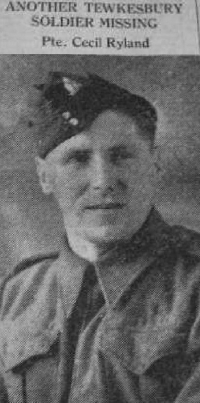
Private Cecil Ryland, 6028743, 4th Battalion Suffolk Regiment who died age 39 on July 3rd 1943, remembered with honour in Kanchanaburi War Cemetery, Thailand.
Cecil was a single man, 39 years of age. As a boy he attended Trinity School, and at the time he joined the forces, was a porter in the employ of the LMS Railway, at Hinton, near Evesham. Private Ryland’s unit, the 4th Battalion Suffolk Regiment had embarked at Liverpool on October 29th 1941 under the impression that they were bound for the Middle East. However, on arriving at Cape Town, after the news of the Japanese entry into the War, they were re-directed to Bombay. Here they underwent specialist training before embarking for Singapore, where, with the 5th Suffolks, they arrived on January 29th. The first thing they witnessed was the evacuation of elements of the RAF from the island and before long it was plain that they had travelled 20,000 miles simply to surrender. This surrender took place less than a fortnight later.
The Tewkesbury Register tells the story as it unfolded to local residents at the time: "Mr and Mrs C Ryland, of 12 Jeynes Row, Tewkesbury, have received official information, that their son, Private Cecil Ryland, of the Suffolk Regiment, has been missing in Singapore since February 15th..."
On September 25th 1943, after eighteen months of silence, the Register reported that: ‘Mrs C Ryland, of Jeynes Row, on Wednesday received an official communication that her youngest son, "Pte. Cecil Ryland, of the Suffolk Regiment, has died from the effects of Beri-beri, whilst a prisoner of war in Japanese hands, at a camp in Malaya..."
Cecil Ryland’s father had died in Tewkesbury the previous month, not knowing of his son’s fate. Cecil’s body was never discovered - he is commemorated at Kanchanaburi War Cemetery, Thailand, the site of a wartime prisoner transit camp. It is likely, therefore, that Cecil was one of the 13,000 prisoners who died during the construction of the notorious Thailand and Burma Railway. On July 29th, 1944, Cecil’s married sister, Mrs Florence Davis, and her husband, were killed by a German flying bomb as it struck their home in Ilford, London.
Major William John Hopper Shephard
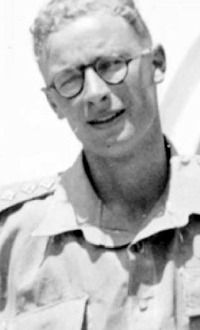
Major William John Hopper Shephard, 9th Battalion, 12th Frontier Force Regiment, who died on January 17th 1944, remembered at the Taukkyan War Cemetery ; Grave 17.B.24.
Major William John Hopper Shephard was killed in action fighting the Japanese in Burma. Aged just 21, he was the second son of the well known local Dr. Hopper Shephard and brother of the retired GP, Dr. Graham Shephard. His brother Michael had been a member of the BEF in France and had won the Military Cross in 1941. Born in Sheerness, Kent, he was educated at Hayleybury College where he was renowned as a “brilliant young cricketer”; indeed he scored a memorable century for Tewkesbury CC, aged only fourteen. Ironically, he was the only one of the family who intended to go in to medicine. He could have continued as a medical student but felt that he could not spend five or six years in a reserved occupation during the war, especially with a brother in the army. When he went out to India, he was for some time in a Regiment commanded by his uncle, Col Bryceson who was a regular Indian Army officer. In fact, that that was partly why he volunteered to take a Commission in the Indian Army. He joined the 8th Battalion of the Glosters in 1940 after which he joined the Indian Army. This photograph was taken shortly before his death. The circumstances of his death are best left to the words of his commanding officer. He seemed to be operating in enemy territory and may have been a Chindit. (A British and Indian unit commanded by Orde Wingate from 1941-1944 which fought behind enemy lines, using guerrilla tactics. Taukkyan was a Chindit War Cemetery.) His CO pointed out that, even though he had lost the advantage of surprise, he realised the importance of his orders to capture a live enemy soldier. “He charged down a steep slope towards the enemy in the face of heavy fire … Though hit in the head he continued to charge until hit in the stomach, when he fell unconscious into the enemy position with a grenade still clutched in his hand. This officer showed the most outstanding bravery.” Following his example his escort then were able to “kill and wound all the enemy in the village”. Why did he not win a medal for this gallantry? It would seem that, from reading the biography of Stan Hollis, the only VC on D-Day, winning such honours was something of a lottery.

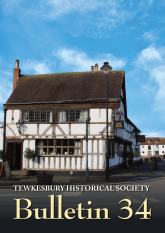
Comments